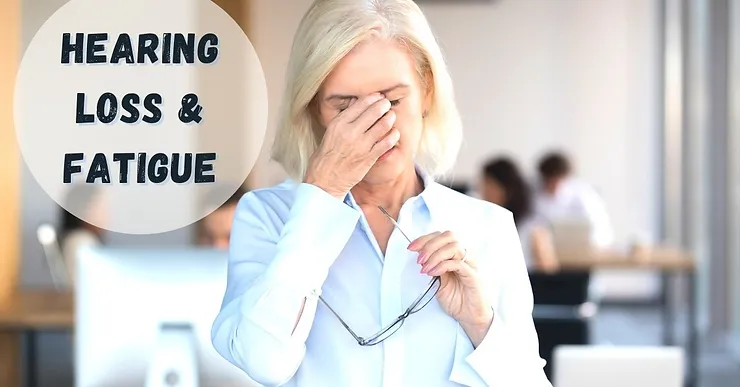
We all experience (or have experienced) fatigue occasionally and are aware of its impact: lack of energy, grogginess, inability to concentrate, difficulty completing tasks etc. Though this is common, when fatigue is experienced chronically, it may be a symptom of an underlying health condition. Listening fatigue is often a symptom of hearing loss which is a permanent medical condition that over 40 million people in the U.S. navigate.
According to the National Institute on Deafness & Other Communication Disorders, nearly 1 in 8 people (ages 12 and over) have some degree of hearing loss. Though it is a pervasive health concern, hearing impairment still remains undertreated. Part of the reason is because it usually happens gradually so people may not realize that their hearing is changing. Knowing the symptoms, including fatigue, can help with early detection of hearing loss, which is important to effective treatment and protecting your hearing health.
Understanding Hearing Loss
Hearing loss is the third most common chronic health condition that older adults experience. It can be caused by a variety of factors including:
-
existing medical conditions: such as cardiovascular disease, hypertension, diabetes, and obesity which impact blood flow, can cause inflammation, restrict air flow etc. that is integral to the auditory system.
-
genetic history: inherited genes, relevant to the process of hearing, can be mutated contributing to impairment.
-
aging: known as presbycusis, age related hearing loss can occur over time as there can be natural changes to the structure of the ears, bone growths, obstructions etc.
-
environmental exposure to loud noise: sound that exceeds 85 decibels is potentially harmful for one’s hearing. We can absorb increased levels of noise at concerts, work environments, listening to music or podcasts on personal devices, being in a sports arena etc.
Sound is absorbed and travels through the ear and is converted in the inner ear. Thousands of hair cells in the inner ear’s cochlea help translate soundwaves into electrical signals. These signals then travel (via auditory nerves) to the brain where they are processed and this is how we are able to understand (and make meaning of) the sound we hear. Most common types of hearing loss are caused by damage of the hair cells in the inner ear by the factors previously described.
Hearing Loss & Fatigue
Hearing loss produces a range of symptoms including:
-
Tinnitus which is a buzzing or ringing noise in one or both ears
-
Sounds are muffled or slurred
-
Frequently asking others to speak slowly and/or loudly
-
Needing to increase the volume on electronic devices to hear
-
Asking others to repeat themselves
-
Difficulty identifying words
-
Not being able to hear clearly in environments with background noise
These symptoms make it incredibly challenging to engage in and follow a conversation. People with hearing loss often try to read mouths or other nonverbal cues, may need to move to a quieter setting, shift to try and hear etc. This can be draining! Conversations can feel like more work than pleasure and leave people feeling exhausted. Adding to this fatigue, is also the impact of the brain working overtime trying to process sound. Because hair cells have a reduced capacity to translate soundwaves, the brain then expends more energy in trying to process incoming sound. This cognitive overload also produces fatigue that can lead to people avoiding conversations altogether!
Strained communication and fatigue can cause people to avoid social interactions and setting. Social withdrawal means spending less time with family and friends as well as participating in the activities that keep you energized. This can impact your mental, emotional, and physical health and can worsen any hearing impairment.
Treatment for Hearing Loss
An effective way to address and alleviate fatigue is to have your hearing assessed. Hearing tests involve a relatively noninvasive and easy process that measures your hearing capacity in both ears.
This identifies any impairment, the degree, and specific type of hearing loss you may be experiencing. Fortunately, there are useful ways that hearing loss is treated. The most common treatment is hearing aids which are electronic devices designed to absorb and process sound, increasing your ability to hear. Treating hearing loss can absolutely improve your overall health and enhance your quality of life! Contact us today to schedule a consultation.
